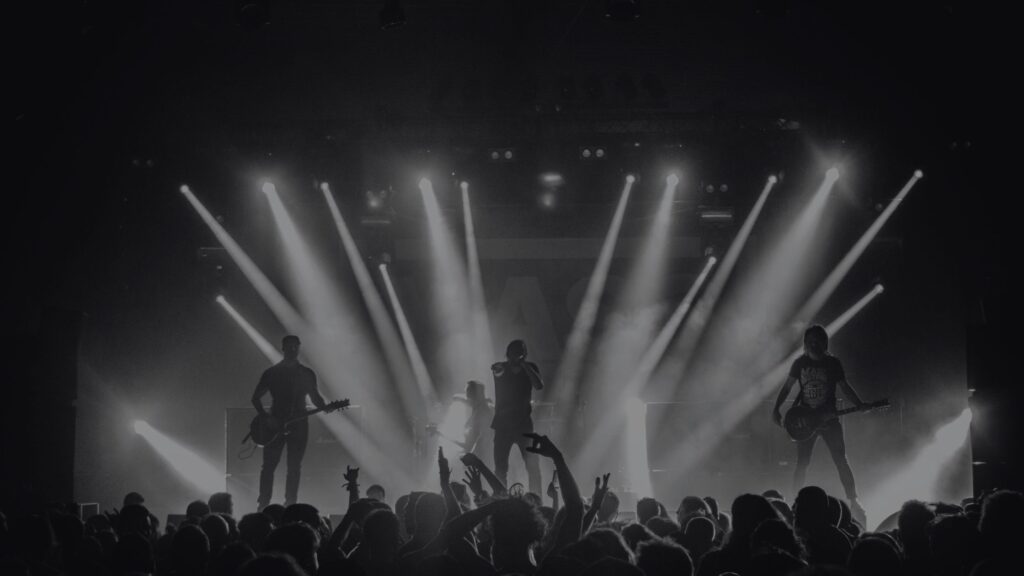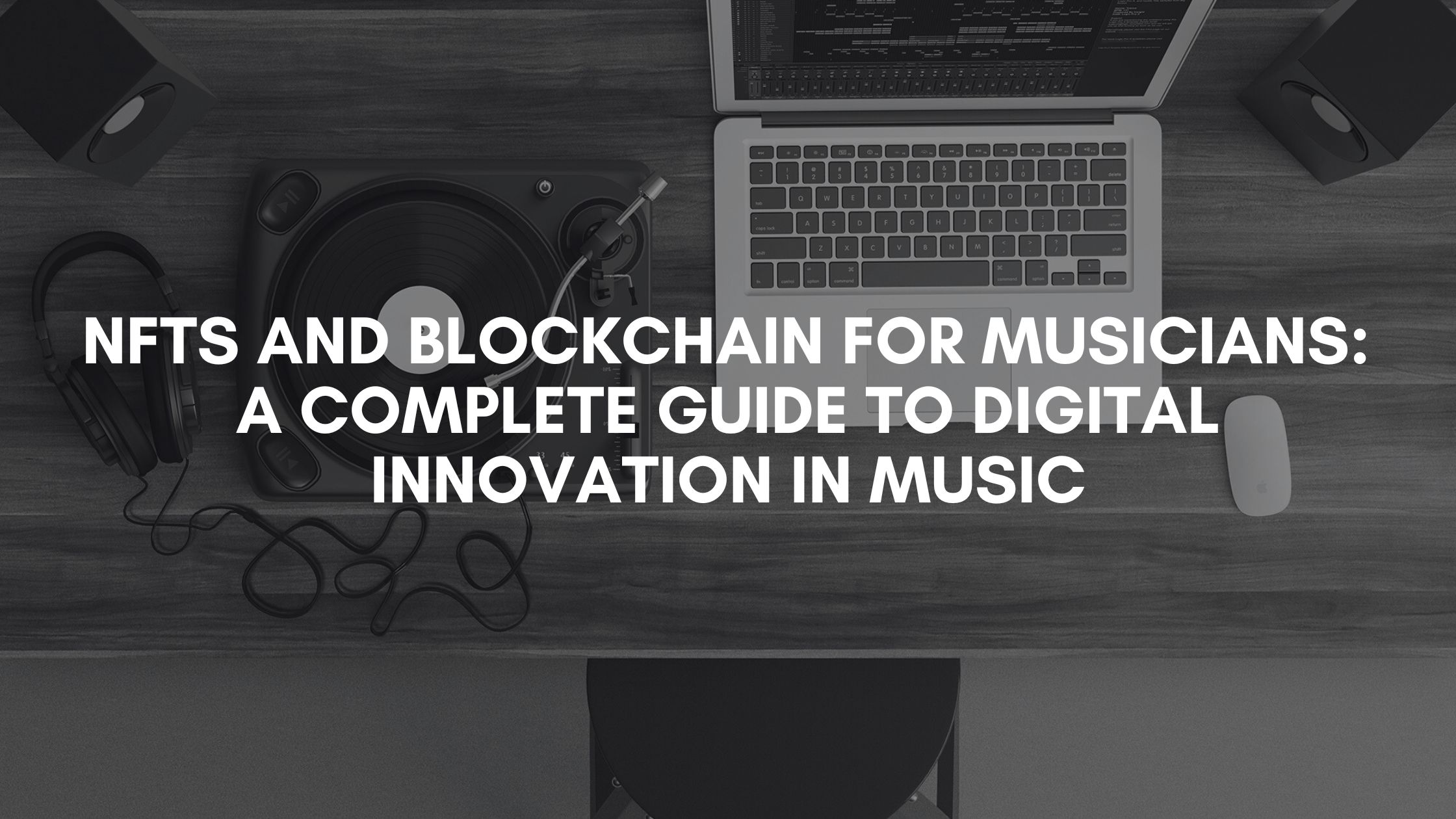|
Listen to the article
Getting your Trinity Audio player ready...
|
Table of Contents
- Introduction to NFTs and Blockchain in Music
- How Blockchain Technology Applies to the Music Industry
- Creating and Selling Music NFTs
- Success Stories of Musicians Using NFTs and Blockchain
- Other Blockchain Applications in Music
- Challenges and Considerations
- Getting Started Guide for Musicians
- Future Trends and Impact on the Music Industry
- A wrap 🌯
NFTs (Non-Fungible Tokens) and blockchain technology are creating new opportunities for musicians daily. These innovations offer novel ways to monetize music, engage with fans, and ensure fair compensation. If you’re a musician or producer looking to navigate this digital frontier, this comprehensive guide will walk you through the essentials, practical applications, and future trends of NFTs and blockchain in the music industry.
Introduction to NFTs and Blockchain in Music
What Are NFTs and Blockchain?
NFTs (Non-Fungible Tokens) are unique digital assets that represent ownership of a specific item or piece of content, such as music, artwork, or videos. Unlike cryptocurrencies like Bitcoin, which are fungible and identical to each other, NFTs are one-of-a-kind and cannot be exchanged on a one-to-one basis.
Blockchain technology is a decentralized digital ledger that records transactions across a network of computers. This technology ensures transparency, security, and immutability of data, making it ideal for verifying ownership and authenticity of digital assets like NFTs.
Why Are NFTs and Blockchain Relevant to Musicians?
For musicians, NFTs and blockchain technology offer innovative ways to distribute, monetize, and manage their music. They enable direct transactions between artists and fans, bypassing traditional intermediaries like record labels and streaming platforms, providing more control and revenue for musicians.
How Blockchain Technology Applies to the Music Industry
Decentralized Distribution
Blockchain allows musicians to distribute their music directly to fans without relying on third-party platforms. This decentralized approach ensures that artists retain control over their work and receive a larger share of the revenue.
Transparent Royalty Management
One of the significant challenges in the music industry is tracking and distributing royalties accurately. Blockchain technology can automate and transparently manage royalty payments, ensuring that all stakeholders are paid fairly and promptly.
Authenticity and Ownership Verification
Blockchain’s immutable ledger can verify the authenticity and ownership of digital music assets. This helps combat issues like piracy and unauthorized use, protecting the rights of musicians.
Creating and Selling Music NFTs
Step-by-Step Guide to Creating Music NFTs
- Choose a Blockchain Platform: Select a blockchain platform that supports NFTs, such as Ethereum, Binance Smart Chain, or Flow. Each platform has its pros and cons regarding fees, speed, and environmental impact.
- Create a Digital Wallet: Set up a digital wallet (e.g., MetaMask, Trust Wallet) to store your NFTs and cryptocurrencies. Ensure your wallet is secure and backed up.
- Mint Your NFT: Use an NFT marketplace like OpenSea, Rarible, or Mintable to mint your music NFT. Upload your music file, add metadata (title, description, cover art), and set the terms of sale.
- List Your NFT for Sale: Choose whether to sell your NFT through a fixed price or auction. Set your price in the cryptocurrency used by your chosen platform.
- Promote Your NFT: Market your NFT through social media, your website, and music communities to attract potential buyers.
Real-World Examples of Music NFTs
- Kings of Leon: In 2021, the band Kings of Leon released their album “When You See Yourself” as an NFT, offering fans exclusive perks like limited-edition vinyl and front-row seats to future concerts.
- 3LAU: DJ and producer 3LAU sold a collection of 33 NFTs for over $11 million, granting buyers unique access to unreleased music and special experiences.

Success Stories of Musicians Using NFTs and Blockchain
Several artists have successfully leveraged NFTs and blockchain technology to create new revenue streams and engage with fans uniquely.
- Grimes: The electronic artist sold $6 million worth of digital art and music NFTs in a single weekend, showcasing the lucrative potential of this technology.
- Deadmau5: The renowned DJ has released multiple NFT collections, including music and digital collectibles, generating significant revenue and fan engagement.
Other Blockchain Applications in Music
Royalties and Smart Contracts
Smart contracts on blockchain can automate royalty payments, ensuring that all parties involved in a music project are compensated fairly and transparently. This eliminates disputes and delays in royalty distribution.
Fan Engagement and Rewards
Blockchain can facilitate unique fan engagement opportunities, such as exclusive content, virtual meet-and-greets, and loyalty rewards. Fans can earn tokens for their support, which can be redeemed for special experiences or merchandise.
Crowdfunding and Investment
Blockchain platforms enable musicians to raise funds directly from their fanbase through token sales or crowdfunding campaigns. Fans can invest in an artist’s career and share in their success through profit-sharing mechanisms.
Challenges and Considerations
Environmental Impact
Minting NFTs and blockchain transactions can consume significant energy, raising environmental concerns. Musicians should consider using eco-friendly platforms or offsetting their carbon footprint.
Market Volatility
The value of cryptocurrencies and NFTs can be highly volatile. Musicians should be aware of the risks and manage their investments wisely.
Legal and Copyright Issues
The legal landscape around NFTs and blockchain is still evolving. Musicians must ensure their rights are protected and understand the implications of selling digital assets.
Getting Started Guide for Musicians
- Educate Yourself: Familiarize yourself with NFTs, blockchain technology, and their applications in the music industry.
- Experiment with Small Projects: Start by creating and selling a few NFTs to understand the process and market dynamics.
- Build a Community: Engage with your fans and other musicians to build a supportive community around your work.
- Stay Informed: Keep up with the latest trends and developments in the NFT and blockchain space to stay ahead of the curve.
Future Trends and Impact on the Music Industry
Increased Adoption of NFTs and Blockchain
As more musicians and fans become aware of the benefits of NFTs and blockchain, adoption is likely to grow. This will lead to new business models and revenue streams in the music industry.
Evolution of Music Consumption
NFTs and blockchain could revolutionize how we consume music, with more emphasis on ownership and direct artist-fan relationships. This shift could challenge traditional streaming models and reshape the industry landscape.
Integration with Virtual and Augmented Reality
Future advancements may see NFTs integrated with virtual and augmented reality experiences, offering fans immersive ways to interact with music and artists.
A wrap 🌯
NFTs and blockchain technology represent a significant digital innovation in the music industry, offering musicians new ways to monetize their work, engage with fans, and manage royalties. By understanding and embracing these technologies, musicians can unlock new opportunities and stay ahead in the ever-evolving digital landscape.


